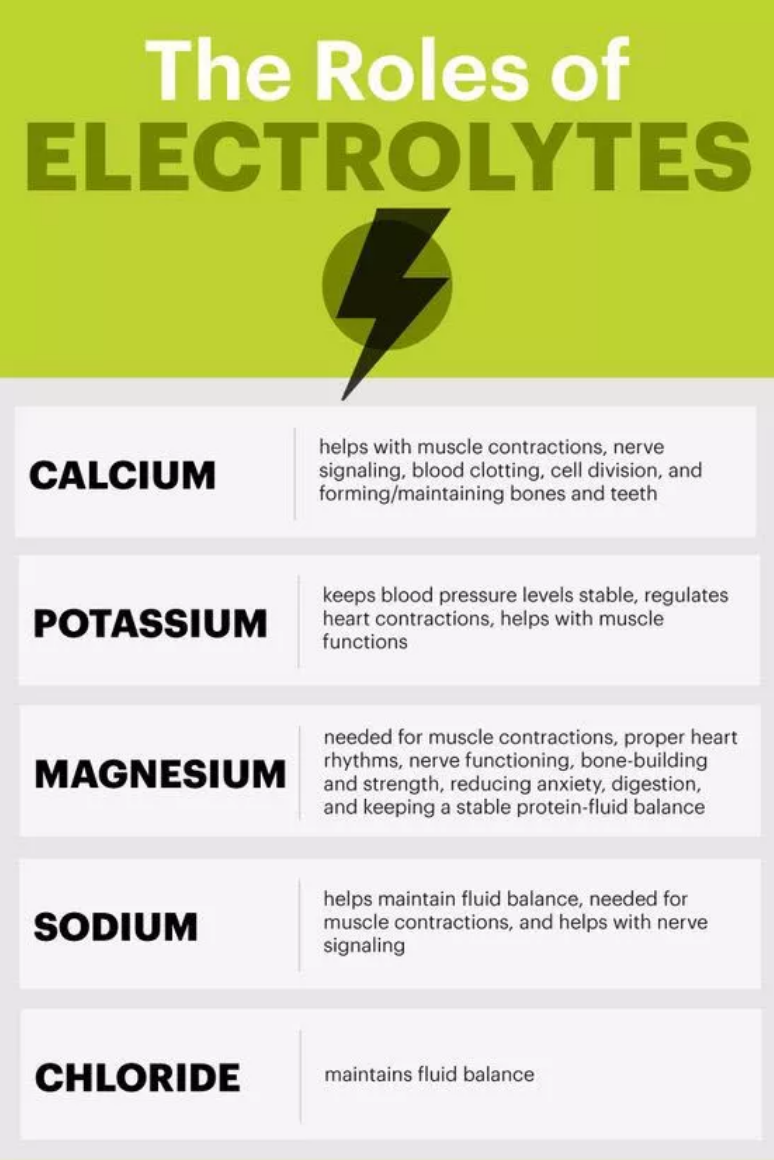What are the common electrolytes in the body?
- Calcium.
- Chloride.
- Magnesium.
- Phosphorus.
- Potassium.
- Sodium.
Electrolytes are minerals found in blood that help regulate the balance of fluids in the body. they are minerals that have a prominent role in regulating blood pressure, muscle contraction and make your system functioning properly.
What is the importance of electrolytes?
the above electrolytes are essential to various bodily functions and an any imbalance could be dangerous and even life threatening.

Phartoonz.com
What are the normal range of electrolytes in the human body ?
These are the normal lab values of the body electrolytes:
ELECTROLYTE
(normal adult range) | DEFICIENCY | EXCESS |
POTASSIUM
(3.5-5 mEq/L) | HYPOKALEMIA- Excessive loss through vomiting,
urination, perspiration, or diarrhea - Use of drugs
- Poor intake of potassium
- Hyperaldosteronism
| HYPERKALEMIA- Renal failure
- Hyporaldosteronism
- Use of drugs
- Excessive intake of potassium
- Condition where potassium
moves out of tissue cells into plasma
|
CALCIUM
(4.5-5.5 mEq/L) | HYPOCALCEMIA- Hypoparathyroidism
- Acute pancreatitis
- Hyperphosphatemia
- Thyroid carcinoma
- Vitamin D deficiency
| HYPERCALCEMIA- Prolonged immobilization
- Hyperparathyroidism
- Malignancy of bone
|
SODIUM
(135-145 mEq/L) | HYPONATREMIA - Excessive loss through
diarrhea, sweating,
vomiting, or use of diuretics - Excessive water intake
- Head injury
- Heat stroke
| HYPERNATREMIA - Loss of fluids through
diarrhea - Deprivation of water
- Excessive salt intake
- Diabetes insipidus
|
CHLORIDE
(95-108 mEq/ L) | HYPOCHLOREMIA- Addison’s disease
- Diarrhea
- Metabolic alkalosis
- Respiratory acidosis
- Vomiting
| HYPERCHLOREMIA- Cardiac decompensation
- Metabolic acidosis
- Respiratory alkalosis
- Corticosteroid therapy
- Uremia
|
MAGNESIUM
(1.5-2.5 mEq/L) | HYPOMAGNESEMIA- Excessive loss from GI tract
- Use of drugs
- Chronic alcoholism
- Diabetic ketoacidosis
- Hyperparathyroidism
| HYPERMAGNESEMIA- Renal disease and renal
failure - Treatment with magnesium
and magnesium-containing
medications
|
PHOSPHATE
(2 5-4.5 mEq/L) | HYPOPHOSPHATEMIA- Alkalosis
- Diabetes
- Chronic alcoholism
- Recovery from malnutrition
- Severe diarrhea
| HYPERPHOSPHATEMIA- Renal failure
- Hypoparathyroidism
- Excessive ingestion of
phosphorus - Trauma
- Heat Stroke
|
Daily electrolytes requirements can be found here.

